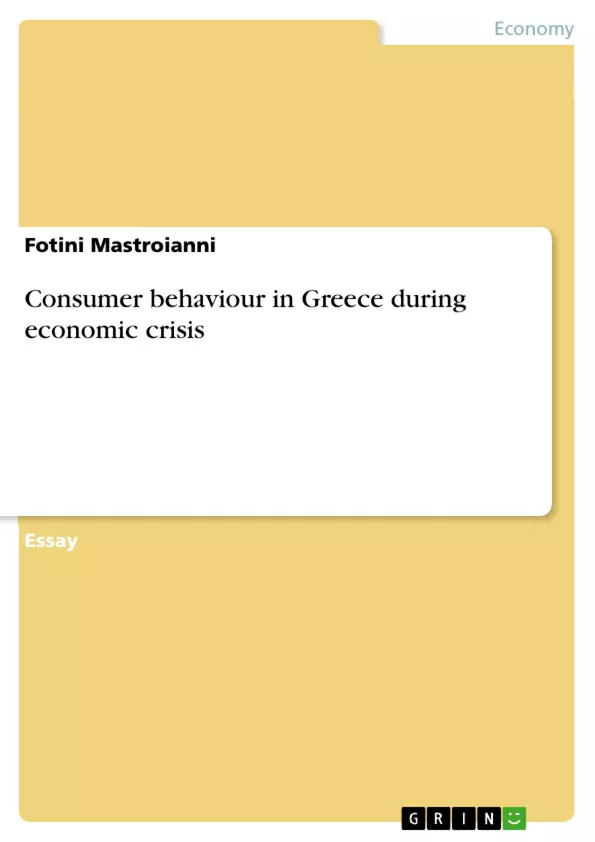This paper examines the characteristics of the Greek consumer prior and during the crisis based on the study of various researches. Its main objective of this paper is the comparison of the Greek consumer style prior to the crisis and during the crisis and the extent to which this is in accordance to the typical consumer profiles in recession times. Another objective is to show that an exogenous factor such as economic recession effects consumer behaviour more than individual factors such as personality.
Inhaltsverzeichnis (Table of Contents)
- Abstract
- Introduction
- Purpose
- Definition of consumer behavior
- Exogenous factors and Consumer Behaviour
- The importance of socioeconomic and demographic factors
- Profile of Greek consumer prior to economic recession
- Greek recession and Consumer
- Typical types of customers in recession
- Profile of Greek consumer during crisis
- Impact of economic crisis
- Increase and decrease spending per product category
- Changing buying behavior
- Emergence of new consumer values
- Conclusion
- References
Zielsetzung und Themenschwerpunkte (Objectives and Key Themes)
This paper investigates the consumer behavior in Greece before and during the economic crisis, drawing upon various studies to understand the evolution of consumer preferences. Its central aim is to compare the Greek consumer profile before and during the crisis, exploring its alignment with typical consumer patterns observed during recessionary periods. Another objective is to demonstrate that external factors, such as economic recession, exert a greater influence on consumer behavior than individual factors like personality.
- Impact of economic recession on consumer behavior in Greece
- Comparison of Greek consumer profiles before and during the crisis
- Influence of exogenous factors on consumer decisions
- Examination of typical consumer profiles in recessionary periods
- Analysis of the changing spending patterns and buying behavior of Greek consumers
Zusammenfassung der Kapitel (Chapter Summaries)
- Introduction: This chapter introduces the topic of consumer behavior in the context of the Greek economic crisis. It highlights the impact of reduced consumption on businesses, sales, and the overall financial system, emphasizing the need to understand the role of macroeconomic factors in influencing consumer decisions.
- Purpose: This section outlines the study's objective, which is to conduct a comparative analysis of Greek consumer purchasing behavior before and during the crisis, focusing on whether economic factors supersede personal traits in shaping purchasing decisions.
- Definition of consumer behavior: This chapter provides a definition of consumer behavior, encompassing all activities, thoughts, and effects associated with product and service consumption.
- Exogenous factors and Consumer Behaviour: This section discusses the influence of external factors, such as economic environment and unemployment, on consumer decision-making processes.
Schlüsselwörter (Keywords)
This paper explores the interplay of economic recession, consumer behavior, and consumer profiles in Greece. It analyzes the impact of external factors like unemployment and economic instability on consumer decisions, comparing spending patterns and purchasing behavior before and during the economic crisis. The study delves into the influence of exogenous forces on consumer behavior and examines how typical consumer profiles in recessionary times manifest in the Greek context. Key concepts include consumer behavior, economic recession, Greece, consumer profile, and exogenous factors.
Frequently Asked Questions
What is the primary objective of the study on Greek consumer behavior?
The study aims to compare the Greek consumer profile before and during the economic crisis to see if it aligns with typical recessionary patterns.
How does the economic recession affect consumer decisions compared to individual factors?
The paper demonstrates that exogenous factors like economic recession exert a greater influence on consumer behavior than individual factors such as personality.
What external factors are specifically analyzed in the context of the Greek crisis?
The research analyzes the impact of the economic environment, unemployment, and economic instability on consumer decision-making processes.
Does the paper examine changes in spending per product category?
Yes, the analysis includes the increase and decrease in spending across different product categories during the Greek recession.
What new values emerged among Greek consumers during the crisis?
The study explores the emergence of new consumer values as a result of the changing buying behavior triggered by the economic downturn.
Which typical customer types are identified during a recession?
The paper discusses typical profiles of customers observed during recessionary periods and compares them to the Greek context.
- Quote paper
- Fotini Mastroianni (Author), 2011, Consumer behaviour in Greece during economic crisis, Munich, GRIN Verlag, https://www.grin.com/document/354221



